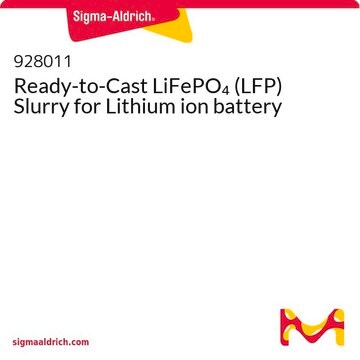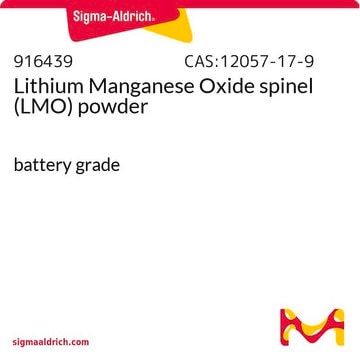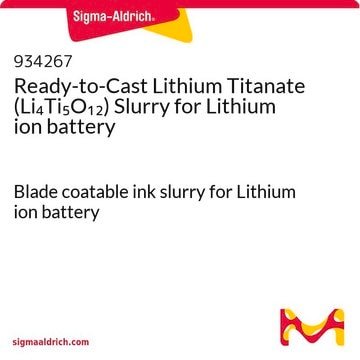702277
Lithium titanate, spinel
nanopowder, <200 nm particle size (BET), >99%
Synonym(s):
LTO nanopowder, Lithium titanate spinel oxide, Lithium titanium oxide
About This Item
Recommended Products
Assay
>99%
form
nanopowder
greener alternative product characteristics
Design for Energy Efficiency
Learn more about the Principles of Green Chemistry.
sustainability
Greener Alternative Product
surface area
32.6 m2/g , BET
particle size
<200 nm (BET)
application(s)
battery manufacturing
greener alternative category
, Enabling
SMILES string
[Li+].[Li+].[Li+].[Li+].[O-][Ti](=O)O[Ti](O[Ti]([O-])=O)(O[Ti]([O-])=O)O[Ti]([O-])=O
InChI
1S/4Li.12O.5Ti/q4*+1;;;;;;;;;4*-1;;;;;
InChI key
BNQVSKURWGZJMY-UHFFFAOYSA-N
General description
Application
Legal Information
Storage Class Code
11 - Combustible Solids
WGK
WGK 3
Personal Protective Equipment
Certificates of Analysis (COA)
Search for Certificates of Analysis (COA) by entering the products Lot/Batch Number. Lot and Batch Numbers can be found on a product’s label following the words ‘Lot’ or ‘Batch’.
Already Own This Product?
Find documentation for the products that you have recently purchased in the Document Library.
Customers Also Viewed
Articles
Nanomaterials for Energy Storage in Lithium-ion Battery Applications
HEVs address rising fuel costs and emissions concerns, utilizing battery packs alongside internal combustion engines for enhanced performance.
Professor Qiao's review explores stable microstructures for lithium metal fluoride batteries, advancing energy storage technologies.
Recent demand for electric and hybrid vehicles, coupled with a reduction in prices, has caused lithium-ion batteries (LIBs) to become an increasingly popular form of rechargeable battery technology.
Our team of scientists has experience in all areas of research including Life Science, Material Science, Chemical Synthesis, Chromatography, Analytical and many others.
Contact Technical Service












